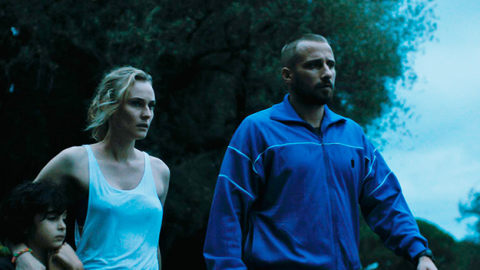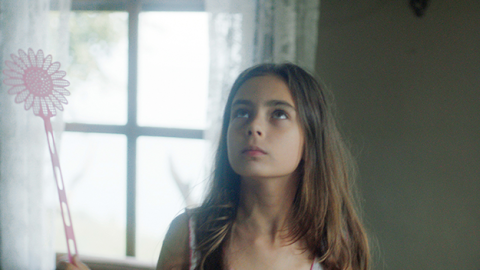Film of the Week: Mustang
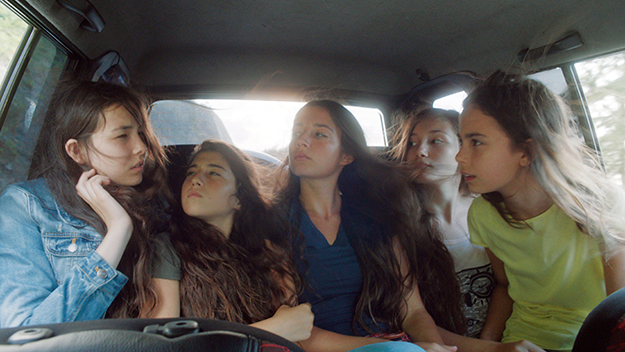
In July last year, Bülent Arınç, Turkey’s deputy prime minister, gave a speech on moral decline, in which he declared that women “should not laugh loudly in front of all the world.” It’s presumably his voice that is heard on TV in the Turkish film Mustang, insisting that “women should be chaste and pure and know their limits.” Arınç’s harangue resulted in thousands of Turkish women going online to post photos and videos of themselves laughing; now there’s an extended riposte to the attitudes he represents in this striking debut feature by Deniz Gamze Ergüven.
Ergüven’s film, which stirred much admiration when it played in Directors’ Fortnight in Cannes this year, has been compared by some to Sofia Coppola’s The Virgin Suicides—but the only real similarity I can see is that Mustang involves solidarity between housebound sisters, who all, like the Lisbons in Coppola’s film, have long luxuriant hair. Their hair indeed evokes the manes of wild horses, mustangs; the title is essentially telling us upfront that its five sisters are lawless free spirits who can never be tamed. In fact, there are moments in the film when a repressive world does seem to get the better of its heroines; still, even in their darkest hours, these sisters’ tresses are never less than lustrous.
The film is set in northern Turkey, in a village on the Black Sea, and starts on the last day of summer term, when five sisters of different ages—all still at school—rush to the sea to celebrate. Wearing their uniforms of white shirts and black ties, they leap in the water fully dressed and splash about; a couple of them ride on boys’ shoulders. It’s all absolutely innocent—yet it involves sexual exploration too, and that mixture of innocence and knowingness is, the film tells us in a celebratory way, the very joy of adolescence. But a fall from this Edenic state is on the way—signaled by a scene in which the girls chomp some freshly plucked apples, before the orchard’s angry owner appears with a shotgun.
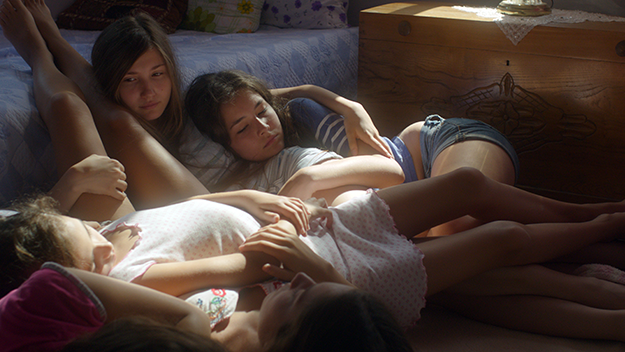
The girls arrive home, at the house where they live with their authoritarian uncle Erol (Aybert Pekcan) and his mother (Nihal Koldas); their parents have been dead for some years. The sisters learn that they have just been snitched on by a neighbor, who regards their behavior on the beach as obscene—and Erol and Grandma agree. One at a time, the girls are furiously told off, while the others batter at the adults’ door in frantic protest—one of the strongest images here.
After they’ve all been carted off to the local hospital to have their virginity checked, the clampdown comes. The house is turned into a prison, with bars installed at the windows and all objects that could possibly lead to moral corruption confiscated. We see their grandmother’s hands go through drawers, removing sweets, phones, computer equipment, improper underwear, even a postcard of Delacroix’s Liberty Leading the People—whether for its subversive message, or because Liberty has her breasts indecorously unveiled. Probably both.
Even so, the girls’ natural exuberance—and indeed the older sisters’ radiant sexuality—cannot be repressed. They’re often seen basking in their skimpies in the summer light, as if modeling for the Trabzon branch of American Apparel. The luxurious glow they bathe in might almost be radiated by the girls themselves. The five of them are shown as a luxuriously sprawling tangle of limbs, hair and stray, slender feet as they loll around their bedrooms, where the hot pink of the décor seems to be not so much a furniture choice as a projection of the sisters’ irreducible femininity (although its depiction at times evokes a certain shampoo-ad aesthetic).
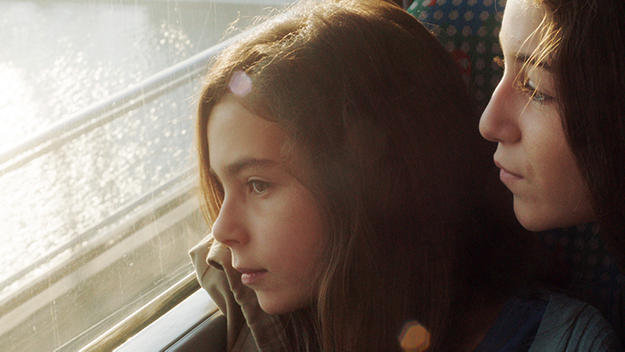
Before long, the girls are made to wear drab shapeless dresses, which they defiantly rip, and the house is turned into “a wife factory,” as youngest sister Lale (Güneş Nezihe Şensoy) puts it. That involves aunts giving cookery lessons, in which the preparation of vine leaves presumably has a symbolic as well as a culinary import. Nevertheless, the sisters contrive to run off and attend a soccer match that’s being played for an all-female crowd. This sequence is a boisterous episode with a nice comic ending—glimpsing them in the stadium on TV, the girls’ aunt contrives a local power cut to keep Erol from seeing them.
While their guardians tout them as potential brides, the girls have their own ideas—especially oldest sister Sonay (Ilayda Akdoğan). She has an ardent admirer who writes her giant-size love letters all over a nearby road, and she’s soon sneaking out for defiantly unchaste trysts. She and her lover are soon married off, which suits them fine, while sister number two, Selma (Tugba Sunguroglu) gets hitched to a sullen lad, Osman (Erol Afsin). The pre-marriage ceremony—the brides veiled in red, the camera weaving in and out between them—has a radiant magic, but the spell is gone by the wedding dinner, where Selma and Osman sit side by side looking glum. Then Selma’s in-laws insist on inspecting the nuptial bedsheets for blood—and rush her off to the hospital to have her virginity checked again. There she’s seen from above, in a long static shot, with a doctor poking a light around under her wedding dress, his presence only visible by the glow through the fabric—an alarming shot, and one of the film’s moments of absurd, painful grace.
With the first two sisters out of the way, things get worse. Sister three, Ece (Elit İşcan), starts playing dangerous games, including screwing a stranger in a car, practically under her uncle’s nose. Then matters turn tragic with an episode that has, in retrospect, been well prepared for, though you don’t see it coming; Ergüven handles it with great delicacy, to genuinely shocking effect.

But Mustang doesn’t dwell on the solemn, and the ending is upbeat, in a way that explains why the film was so popular in Cannes (it also won the Audience Award at the Chicago film festival). Overall, the film deals with reality in a way that, to repeat a phrase Ergüven uses in her press notes, is essentially a “fairy tale.” There’s a certain amount of wish fulfillment involved. Ergüven has said that, as a girl, she herself got in trouble for high jinks, but never fought back as her heroines do; Lale, she says, is “a condensed version of everything I dream of being.”
Of course, Mustang does relate to an observable reality, as Bülent Arınç’s diktat on laughter makes clear. The film is a direct response to repressive attitudes to women in contemporary Turkey and other Islamic countries (although the sisters’ treatment seems almost benign compared to situations we’ve seen in certain Iranian films about women, such as Jafar Panahi’s The Circle or Mania Akbari’s One.Two.One).
Yet aspects of Mustang make its purchase on the real that much more tenuous. The fact that the sisters are so flawlessly gorgeous makes them seem more like nature spirits or mythical princesses than real young women (do they ever suffer acne? period pains? even—God forbid—split ends?). There’s a great deal of awkward overstatement, not least the over-emphatic presentation of Lale as an irrepressibly outspoken spirit of resistance from the very start. Learning that neighbor Mrs. Petek has informed on them, Lale yells at her: “Do your shit-colored clothes make you everyone’s judge?” I couldn’t buy this, but in any case, it’s dramatically ineffective; compare Brooklyn, where Saoirse Ronan’s heroine gets a cheer from us because she finally talks back to a small-town scold, towards the end.
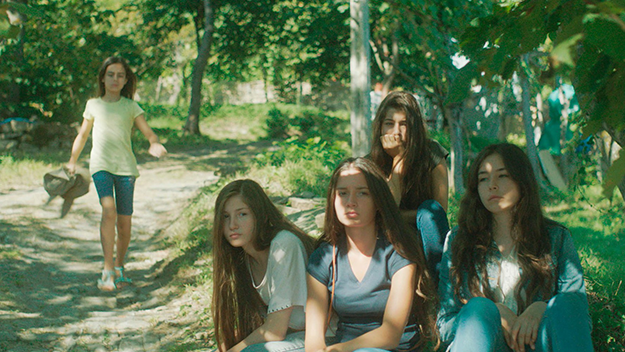
Lale is the vehicle for the film’s poetic reveries, embodying freedom and unity with the elements, as in an elegant sequence in which she takes a long coast road walk. But too much weight is placed on her both as rebel leader and as observer—and she’s made intermittently to deliver a redundant voiceover narration (“Now the house really did look like a prison,” she says, as we watch more bars go up). It’s a shame, because Güneş Nezihe Şensoy’s performance speaks for itself: with her wide, ever-watchful eyes and sharp features, Lale constantly comes across as an alert, intelligent presence, scornfully seeing through the nonsense around her.
Mustang is guilty of overstatement in other ways. Uncle Erol, pitched somewhat as an irascible melodrama cad, turns out to be molesting one sister—as if general tyranny weren’t enough of an abuse to make the necessary case. And the film weirdly overstates men’s perverse idealization of women when Erol is overheard reminiscing about kissing the soles of his mother’s feet: “That’s the fragrance of paradise.” There is, however, a nice glimpsed image of men and their mothers, which I’m guessing Ergüven happened to pick up docu-style, a shot of an elderly woman on a balcony with an obese middle-aged man, presumably her son; he’s wearing a T-shirt with the legend “Screw.”
To be honest, as a statement about the repression of female sexuality in Islamic cultures, Mustang wasn’t the most striking or the riskiest film in Cannes this year. That was a feature by a male director, Morocco’s Nabil Ayouch, Much Loved, which uses a traditional realist framework to talk about attitudes to prostitutes in modern Arabic cultures, and that has the virtue of saying something specifically trenchant, and therefore all the more globally resonant, about the situation in one country.

A French-German-Turkish co-production, Mustang rather dilutes its power by using a kind of international art-cinema style—a sometimes glossy impressionism that often seduces us with particular effects at the expense of narrative or emotional coherence. The elegant, glowing cinematography is by two credited DPs, one French, the other Turkish, respectively David Chizallet and Ersin Gök. Although Turkish-born, director Ergüven has spent much time in France (she studied at FEMIS), and Mustang is co-written by French writer-director Alice Winocour, whose own two features (the historical Augustine and this year’s thriller Maryland, aka Disorder) are both, in different ways, stories of female imprisonment. This is not to criticize Mustang as not being “authentically” Turkish, whatever that might mean, but there’s a sort of glossy cosmopolitanism to its appeal that makes the film seem not quite convincingly rooted in the world it depicts.
Even so, Ergüven shows a directorial brio and a skill for atmospheric intensity that are confident and compelling, and she backs up the theme of female solidarity by making her young actresses so vividly and believably a sibling unit—between them, they have a radiant charisma and a complicity that’s always winning. If Mustang is ultimately a fairy tale, an affirmative girl-power myth, then fair enough: these sisters are Rapunzels, doing it for themselves; a five-girl stampede. They are woman, hear them roar. Or at least neigh.



